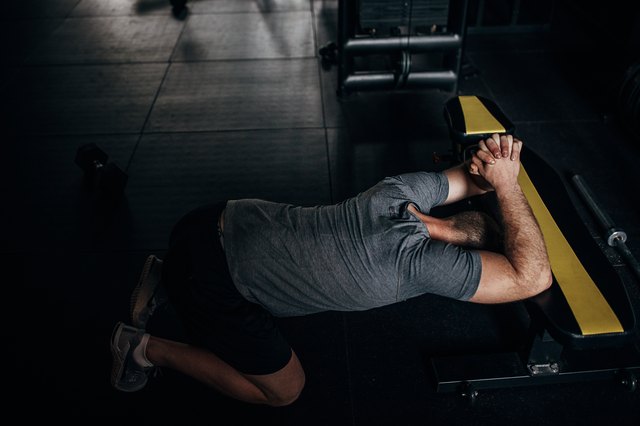Many of us struggle with tight lats and triceps. We use these muscles for lots of exercises, and they can get stiff when we sit all day at work. The bad news: Over time, tight lats and tris can negatively impact our shoulder mobility and contribute to pain in our shoulders, neck or lower back.
But there’s good news, too. You can loosen up your upper back, arms and shoulders — and improve your shoulder mobility — using a drill called the bench prayer stretch.
The bench prayer stretch, also known as the bench thoracic spine mobilization, is a simple drill where you place your elbows on a bench and rock backward to stretch your upper body.
You can use this exercise to stretch your back and arms, and it can also improve mobility in your thoracic spine and shoulders.
The prayer stretch primarily stretches your latissimus dorsi and the long head of your triceps. You may also feel some stretching in your neck and glutes along with activation of your core muscles.
Add it to your warmup, workouts or daily mobility routine to move better now — in and out of the gym.
How to Do the Prayer Stretch on a Bench
Time
1 Min
Activity
Mobility Workout
- Kneel on the floor facing an exercise bench or another elevated surface. Place a foam pad or pillow under your knees for comfort.
- Place your elbows on the bench and press your palms together. Make a double chin to keep your head tucked.
- Rock your hips back toward your feet. Arch your upper back as you gently push your head down between your arms beneath the edge of the bench. You should feel a stretch in the sides of your back and the back of your arms.
- Hold the stretch position for 30 to 60 seconds while you take slow, relaxed breaths. Or, you can slowly rock back and forward for 5 to 10 reps.
Tip
If you want to take your bench prayer stretch to the next level, perform it holding a broomstick or PVC pipe in your hands. This allows you to pull yourself into a deeper stretch.
Benefits of the Bench Prayer Stretch
1. Loosens Up Tight Muscles
The prayer stretch on a bench is very effective at stretching your lats, which are the large muscles that span most of your middle back. You can also use it to relax tight triceps.
Both of these muscles see lots of action at the gym because you use them in so many different exercises. Tight lats and triceps can both limit joint mobility and potentially contribute to aches and pains.
You can use the bench prayer stretch to loosen up so you feel better in and out of the gym. For best results, do this at least once or twice a week. Consistent practice is essential to see lasting benefits.
2. Improves T-Spine Mobility
Your thoracic spine is the portion of your spine running from the bottom of your ribs up to your neck. This area should be able to easily flex (bend), extend (arch) and rotate.
T-spine mobility is an essential if you want to keep your neck, shoulders and low back healthy. Unfortunately, many factors can make your T-spine more stiff. Lack of use, too much sitting in front of a computer and even an unbalanced training program can all contribute to T-spine mobility limitations.
The bench prayer stretch can help you reclaim mobility here, particularly your ability to extend. Focus on gently arching your upper back each time you perform the stretch.
3. Improves Overhead Mobility
The combination of looser lats and triceps plus improved T-spine mobility often leads to better overhead mobility. That’s because you need to be able to extend your T-spine and lengthen your arms in order to push or pull weights overhead.
If you struggle to get your arms overhead without bending your elbows or arching your lower back, the bench prayer stretch can help.
How to Add It to Your Routine
1. As Part of Your Warmup
The prayer stretch is the perfect addition to your pre-strength training warmup. If you’re using this before you train, use the dynamic version where you actively rock back and forth. Perform 1 to 2 sets of 5 to 10 reps.
2. As Active Rest During a Workout
You can sprinkle sets of prayer stretches throughout your workout to stay loose using a strategy called active rest. This is where you perform stretches or drills in between sets of strength exercises to sneak in extra mobility work.
The bench prayer stretch works particularly well paired with exercises that restrict T-spine movement, such as the barbell and dumbbell bench press. You could also use it with overhead pushing and pulling movements, like overhead press or chin-ups.
3. As Part of a Daily Stretching or Mobility Routine
If you already have a daily stretching or mobility routine, it’s easy to add the bench prayer stretch. Try performing the static version where you hold the stretch position for 30 to 60 seconds. You can use a sturdy couch or chair if you’re doing this at home.
Read the full article here

